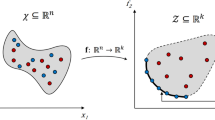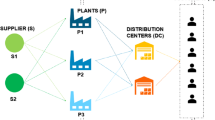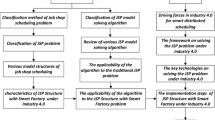Abstract
Two levels of the process planning problem may be distinguished: the local problem, i.e. the production of a single part, and the global problem concerned with the interdependence of a group of parts to be manufactured. At the local level, one is faced with the completeness and the proper sequencing of the required operations. This may be related to the set covering problem and to topological sorting, respectively. The global problem is more involved and two important models are discussed: the process selection model and the FMS scheduling model. The process selection model is formulated as a clique problem. The FMS scheduling model is described as a constrained travelling salesman problem, and for its decomposition cluster analysis is applied.
Similar content being viewed by others
References
A. Kusiak, Flexible manufacturing systems: A structural approach,International Journal of Production Research,23, pp. 1057–1073, 1985.
V. Chvatal, A greedy heuristic for the set covering problem,Mathematics of Operations Research,4, pp. 223–235, 1979.
E. Balas and A. Ho, Set covering algorithms using cutting planes, heuristics, and subgradient optimization,Mathematical Programming,12, pp. 37–60, 1980.
A. Kusiak and G. Finke, Hierarchical approach to process planning,Applied Discrete Mathematics (forthcoming), 1987.
G. Finke and A. Kusiak, Network approach to modelling of flexible manufacturing modules and cells,Revue Française d'Automatique d'Informatique et de Recherche Operationelle (RAIRO-APII),19., pp. 359–370, 1985.
A. Kusiak, The part families problem in flexible manufacturing systems,Annals of Operations Research,3, pp. 279–300, 1985.
J. K. Lenstra, Clustering a data array and the travelling salesman problem.Operations Research,22, pp. 413–414, 1974.
A. Kusiak, Part families selection model for flexible manufacturing systems,Proceedings of the 1983 Annual Industrial Engineering Conference, Louisville, KY, USA, pp. 575–580, 1983.
K. R. Kumar, A. Kusiak and A. Vannelli, Grouping parts and components in flexible manufacturing systems,European Journal of Operational Research,24, pp. 387–397, 1986.
A. Kusiak and G. Finke, Modelling and solving the flexible forging module scheduling problem, Working paper No. 85/06, Department of Mechanical and Industrial Engineering, University of Manitoba, Winnipeg, Manitoba, 1985.
Author information
Authors and Affiliations
Rights and permissions
About this article
Cite this article
Finke, G., Kusiak, A. Models for the process planning problem in flexible manufacturing systems. Int J Adv Manuf Technol 2, 3–12 (1987). https://doi.org/10.1007/BF02601472
Issue Date:
DOI: https://doi.org/10.1007/BF02601472




